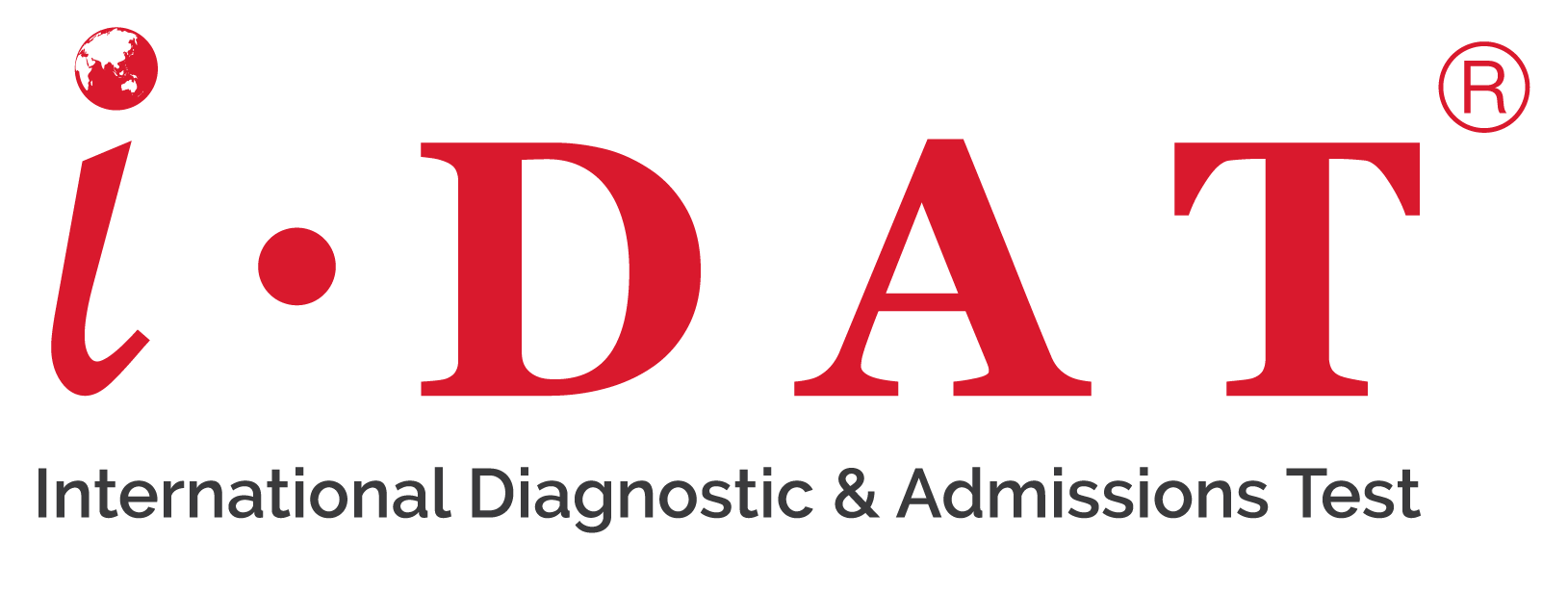OVERALL SCORE
THE SCORING FOR OVERALL OF ALL THE SECTIONS
<50%
Not Ready - Extensive Prep Required
50%-60%
Ready with Significant Support
60%-70%
Ready with Continual Support
70%-80%
Ready with Minimal Support
80%-90%
Ready
>90%
Classroom Excellence
SCORES EXPLAINED
HOW IS THE TEST SCORED?
The score for English, mathematics, and global knowledge are tallied and expressed as a percentage. For all academic sections that use multiple choice, the score is a percentage of correct answers from multiple-choice questions attempted in each section.
The results pages are quite easy to read and understand and are designed to give an overall view of how “ready” a student is for the classroom. The “overall score’ dial is each individual score listed and divided and weighted evenly. The English score dial represents each of the four skills weighted evenly; reading, writing, listening and speaking. For the IDAT concise, this does not include speaking. The math scores and general knowledge scores are equally weighted each internal section have the same value.
The diagnostics on the page show whether students have achieved an outcome (80-100%),, are working towards an outcome (50-80%), or not achieved the outcome as yet (>50%). These outcomes directly correlate to the IDAT curriculum, available on this website in the test format section.
<50% NOT READY - EXTENSIVE PREP REQUIRED
Extensive preparation and remedial study needed
Stilted speaking with only rehearsed and prepared answers coming out with any fluency.
Inability to speak spontaneously and lack of grammar, pronunciation skills and vocabulary interfere with meaning.
Response adequately addresses some components of the question, but contains irrelevancies.
Illustrates that a part/part of question have been missed/not understood.
Able to write only simple words or phrases appropriate to age level. Limited use of grammar, using only 2 or 3 tenses and not always correctly. Shows lack of basic sentence knowledge and subject/verb agreement is undependable. Answers only in short and does not expand on ideas.
50% - 60% READY WITH SIGNIFICANT SUPPORT
Some preparation course needed
Is able to respond to some questions but perhaps only with limited spontaneity.
Not speaking in full sentences and lack of grammar, poor pronunciation skills, and limited vocabulary occasionally interferes with meaning.
Shows some school learning of English but not ready for classroom.
Requires >10 hints or helpers with the test either in the form of slower speech or alternate questions.
Can readily respond to some (more than 4) question stimulus with understanding of the questions.
Can write short simple sentences appropriate to age/grade level demonstrating basic knowledge of tense and subject/verb agreement. Uses some compound sentences and occasional connectives. Student meets minimum sentence amount, but sentences lack originality or variance.
60% - 70% READY WITH CONTINUAL SUPPORT
Continual support required
Able to organize and express verbally in rehearsed and some spontaneous situations. Broken sentence structure or mixed grammar and vocabulary are present but not generally interfering with meaning. Pronunciation may have some common errors present, but student is mostly comprehensible.
Requires 6-10 hints or helpers with the test either in the form of slower speech of alternate questions.
Can readily respond to most (more than 6) question stimulus with understanding of the questions.
Writes at length appropriate to age and development but still displays lack of cohesion in writing. Sentences are complete but not necessarily connected and interesting. Uses some complex vocabulary interspersed in basic sentences with limited adjectives. Adverbs are not mastered, but attempts may be made to use them. Prepositions and articles are continual problems.
70% - 80% READY WITH MINIMAL SUPPORT
Minimal support required
Able to present a well-organised interview.
Uses modal verbs to modify comments. Student shows knowledge of complex sentence and spontaneous speech demonstrating interaction and self-awareness. Student may self-correct. There is knowledge shown of tenses although some errors may still be present. Pronunciation does not interfere with meaning. Phrasal verbs are used readily.
Requires 4-5 hints or helpers with the test either in the form of slower speech of alternate questions.
Can readily respond to most (more than 7) question stimulus with understanding of the questions
Student can appropriately plan, organise, write and edit using suitable vocabulary and accurate grammar. Has competent use of sentence structure, verb agreements, tense usage, but may not understand paragraphs.
Uses some colloquial phrases and phrasal verbs correctly. Complex sentences and adverbs of time used appropriately but still has some problems with higher level verb conjugation.
80% - 90% READY
Capable with daily classroom studies and activities
Student is able to describe and share information with comfort and connected speech.
Uses complex noun groups, can explain complex terms, some idioms, and vocabulary which shows preparation and thought.
Shows ability to deal with unknown vocabulary in speech.
Can modify comments, use connected speech and modifiers in conversation. Pronunciation presents no problem for listener comprehension.
Requires 1-2 hints or helpers with the test either in the form of slower speech of alternate questions.
Can readily respond to question stimulus with understanding of the questions.
Appropriate to age and developmental stage, shows forethought and planning with writing and some knowledge of text type but without mastery of associated conventions. Grammar and vocabulary demonstrated are appropriate to peer level with limited errors which do not interfere with meaning. Uses complex sentences, colloquial phrases and phrasal verbs with accuracy. Connectives and dependent clauses are used but may not always be accurate.
90% - 100% CLASSROOM EXCELLENCE
Outstanding skills to support school studies and activities
Able to talk at length about familiar topics and adjust for unknown vocabulary.
Grammar has only small errors but speaking at pace.
Pronunciation and intonation near native speaker or native-speaker like.
Use of idioms and jargon are generally mastered. Can use unusual terms, and is engaging and original in answers. Displays attributes to verbally command and maintain classroom communication.
Requires 1-2 hints or helpers with the test either in the form of slower speech of alternate questions.
Can readily respond to question stimulus with understanding of the questions.
Appropriate to age and developmental stage, shows forethought and planning with writing and some knowledge of text type but without mastery of associated conventions. Grammar and vocabulary demonstrated are appropriate to peer level with limited errors which do not interfere with meaning. Uses complex sentences, colloquial phrases and phrasal verbs with accuracy. Connectives and dependent clauses are used but may not always be accurate.
CHARACTER SECTION
HOW IS THE CHARACTER SECTION SCORED?
The character section of the test is not ‘scored’ in a traditional way.
The test was structured by experienced child psychologists and is a series of multiple-choice questions which ask the student to self-assess their self-awareness, preferred communication and study styles and collaborative skills, attitude and aptitude for risk-taking.
The report will show what attributes a student’s answers indicated, and schools may use this report to help them guide further teaching and learning.
DIAGNOSTIC
STUDENTS’ CURRENT KNOWLEDGE AND CAPABILITIES
Diagnostic assessment can help identify students’ current knowledge of a subject, their skill sets and capabilities, and to clarify misconceptions before teaching takes place. The IDAT tests diagnose students’ current knowledge and capabilities as demonstrated through the IDAT assessment on test day according to the outcomes-based curriculum outlined on the IDAT website. Schools are informed if students have achieved the outcomes, are working towards the outcomes or have not achieved the outcomes for the IDAT mathematics and English curriculum.

